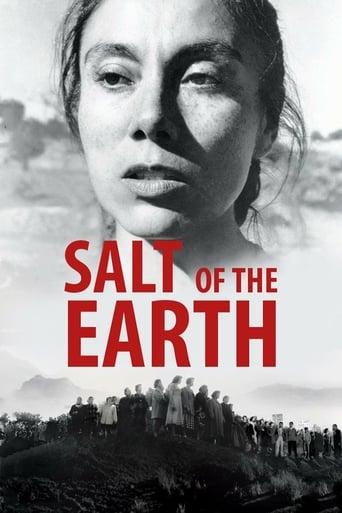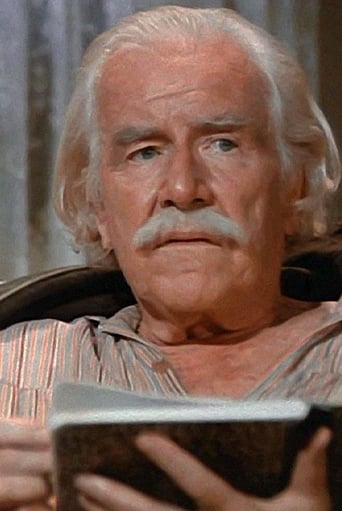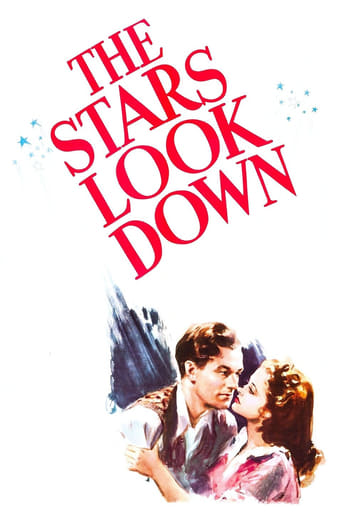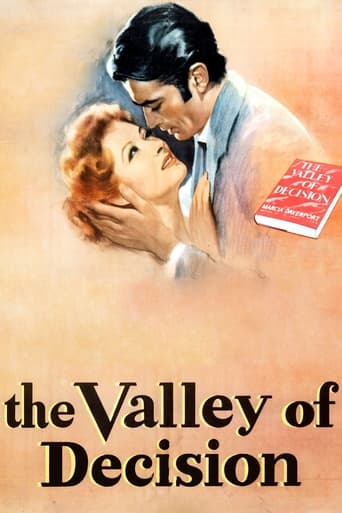Salt of the Earth (1954)
At New Mexico's Empire Zinc mine, Mexican-American workers protest the unsafe work conditions and unequal wages compared to their Anglo counterparts. Ramon Quintero helps organize the strike, but he is shown to be a hypocrite by treating his pregnant wife, Esperanza, with a similar unfairness. When an injunction stops the men from protesting, however, the gender roles are reversed, and women find themselves on the picket lines while the men stay at home.
Watch Trailer
Cast
Similar titles
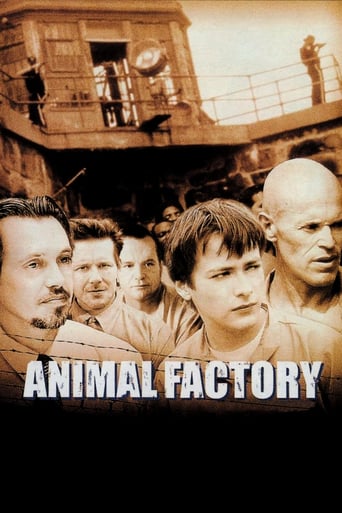

Reviews
Memorable, crazy movie
A Disappointing Continuation
The performances transcend the film's tropes, grounding it in characters that feel more complete than this subgenre often produces.
Like the great film, it's made with a great deal of visible affection both in front of and behind the camera.
I'm so glad I saw this film! It shows the power of solidarity - people of all backgrounds, gender, and whatever other category might otherwise be used to separate them, uniting together to gain the power and dignity they deserve as human beings. It took some of them a while to learn, but the common struggle tears down walls. Rise up, and push everyone else up with you!
The Salt of the Earth, which came out in 1954 paints an almost too real picture of how migrant workers were treated before the civil rights movement. It is easy to see why the United States government, which was going through "The Red Scare" during this time, blacklisted this film. The film touches on and provokes many issues that were very sensitive during this era. Issues such as racism, equality, and feminism are the key themes in the movie. Racism was still very apparent in the United States during the 1950's, namely because the civil rights movement had not happened yet. The film pits the whites or "Anglos" against the Mexican workers. However, not all the whites in the film are depicted as evil. There are a few Caucasian workers who side themselves with the Mexicans. This gives the film a much more "real" atmosphere to it because it doesn't allude to one race being good and the other evil. Instead of simply having the whites be the antagonist, the film sets the leader of the mining company up to be the antagonist. Despite having a few whites on the side of the Mexican workers the film clearly sympathizes with the Mexicans. The film controls the in a way so the audience will undoubtedly root with the workers. The Mexican workers have poor safety requirements, which constantly lead to accidents on the site. This is all so the company can save money. When the Mexicans complain of this they are threatened with being replaced with an American worker by the foreman. The film does a good job of painting the leaders of the mining company as evil. There is a scene in the beginning where the foreman tells the workers to get back to work right after one of the workers is nearly killed in an explosion. This shows that the leaders have no compassion for the workers and that they are only in the business for the money with no care of the well being of the Mexicans. Also, the scene where they capture Ramon Quintero and beat him is very powerful and really makes you sympathize with that character. Another issue the film tries to push is feminism. The film starts off early with the Mexican workers acting very sexist toward their wives. Ramon is very controlling of his wife, Esperanza. There is an early scene where Ramon tells Esperanza to stop crying and wasting her time listening to the radio. This scene alone sets up the fact that sexism is an issue in this town. Another scene that depicts this fact is when all the women are trying to convince Esperanza to take part in a picket line. One of the wives complains that she works very hard and is still treated as though she is useless by her husband. However, once the men are not allowed to take part in the picket line the women become very involved. The men begin to understand that the wives can help with the strike. The film came out in 1954. The United States was in a false sense of calm during this time. The economy was booming. This lead to the growth of materialism and the country was becoming vastly capitalist. With the exception of the cold war and the communist scare the country was going through a very calm time. Salt of the Earth acts as a sort of a wake up call. It pushes all of these unseen issues to the light so people can become aware that there are still injustices going on inside the country. The main point of the film is equality. The film's conflict is a struggle for the races and sexes to become equal in the eyes of the government. Salt of the Earth was clearly ahead of it's time.
My interest in this movie was due to the negative reaction that it received when it was first released. In the interest of full disclosure, I am not in favor of compulsory union membership. I strongly believe that union membership should be entirely voluntary, and members should be able to keep the union from using their dues for political causes that the members do not support. That being said, I found this movie very entertaining and inspiring. These were people whose entire lives were dependent on the mine and their ability to earn a decent wage. They were totally invested in the union and had to live with the consequences, good or bad, of their actions. The women were as invested in the mine and the union as were their husbands, even though they were not actually employed by the mine or members of the union. The actions of these women were truly inspiring. But I did notice three areas which I think make the union portrayed in this movie completely different from today's unions: 1. The union leaders put up with the same hardships as the rank and file. Their jobs were on the line and they also suffered from not being paid, and were just as dependent on the donations from others outside of their union. 2. The union members (and eventually the wives as well) were free to vote their consciences with respect to all actions proposed by the union. There did not appear to be anyone who was trying to bully or unduly influence the other members to vote a particular way. 3. There were no politicians (local or from Washington) involved in the strike. There were no congressional hearings or big union bosses trying to influence the strike. Other than the donations of food and other necessities from other sympathetic unions, the mine workers were on their own.
In the early 1950's, film studios were under attack from two directions. Small screen TV had put a big dent in theatre attendance, while the Mc Carthyite cold war had put a big chill in the cultural milieu. A formerly lucrative industry found itself suddenly reeling, with a future no longer very certain. In short, the commercial winds had changed and Hollywood needed an overhaul. To meet TV's challenge, studio moguls introduced big screen Cinerama, biblical spectaculars and full-cleavage romance goddesses; to please congressional investigators, they fired unrepentant left-wingers and blackballed them from future employment. Social commentary, never much of a staple, disappeared entirely, while the escapism of Westerns, Tennessee Williams, and bedroom innuendo took over. The 50's had arrived with a vengeance. Against this backdrop, Salt of the Earth appears to have parachuted in from another planet. In retrospect, the film's look, feel, and values, plus use of non-actors, represent an anti- Hollywood aesthetic in just about about its purest form. Instead of the usual ersatz, there are company shacks, a desolate land, and real workers sometimes speaking a foreign tongue about hot water and labor solidarity. This was and is about as far removed from the fabled dream factory as any commercial film before or since. To my knowledge, Salt is the only professional movie made in America by known communists. And though I've seen it a number of times, I've yet to detect a theme that any conscionable liberal would disagree with. The emphasis throughout is on reform, not revolution. So why was the movie so thoroughly ostracized. Aside from the obvious negatives, there are two aspects that challenge patriotic assumptions about the power of the individual. The strikers win because of their solidarity, that is, their capacity to overcome internal divisions in pursuit of common goals. But more importantly, theirs is a leaderless solidarity. Unlike so many other labor films, no one person arises in Salt to take charge or direct the actions of the others. No single iconic personality dominates. Community of labor is the real agent of change and victor here, while no one individual can be pointed to as indispensable. Second, through the pivotal role of Esperanza (a professional actress), the individual is shown as flowering amidst the common effort. Far from being submerged in a faceless mass, she discovers through participation a heightened sense of individualness and a wealth of hidden talents. Moreover, a stronger, more confident Esperanza means a stronger, more confident strike effort. In short, it's not individuality versus the group, but individuality from within the group. I don't know how subversive these ideas ultimately are, but I do know they challenge decades of iconic film-making, in which the omnipotent movie star, a John Wayne or a Sylvester Stallone, is transformed into a demi-god and exalted above the common folk. Against this grain, Salt seeks to empower its audience, not dis-empower. There are many fine touches in the film. I'm glad the workers are not romanticized, nor are the bosses or their law-enforcement allies caricatured. Instead the hardscrabble families are treated as ordinary people, able, nevertheless, to act intelligently beyond the cultural limits placed upon them. Ordinarily, the viewer would expect a heavy hand with such politically charged material; however, the producers have the good sense to hew to a lighter approach that features unexpected deposits of humor, as when the men whine about being forced to hang out the wash. This furnishes both a good laugh and an incisive piece of social commentary. In fact, most of the movie's considerable humor comes from its strong feminist subtext, certainly a striking exception to the Ozzie and Harriet stereotypes of the period. Despite an obvious appeal to cultural historians, Salt is much more than a mere artifact. There is, of course, no more Mc Carthy-led purge, and miners' wives have long since gotten hot water and indoor plumbing thanks to labor militancy. Nevertheless, the film's social themes continue to reach beyond that long-ago period. Women continue to strive for equality, just as the workers' wives in Salt struggled as domestics against the chauvinism of their husbands. Moreover, the need for racial equality remains as pressing now as it was in Michael Wilson's prescient screenplay. And, of course, there's labor's ongoing battle to get something like a fair share of the wealth it produces. Far from being a dead artifact, the power of this suppressed treasure along with the courage of the men and women who made it, continues to echo across the decades, furnishing inspiration to generations to come.
